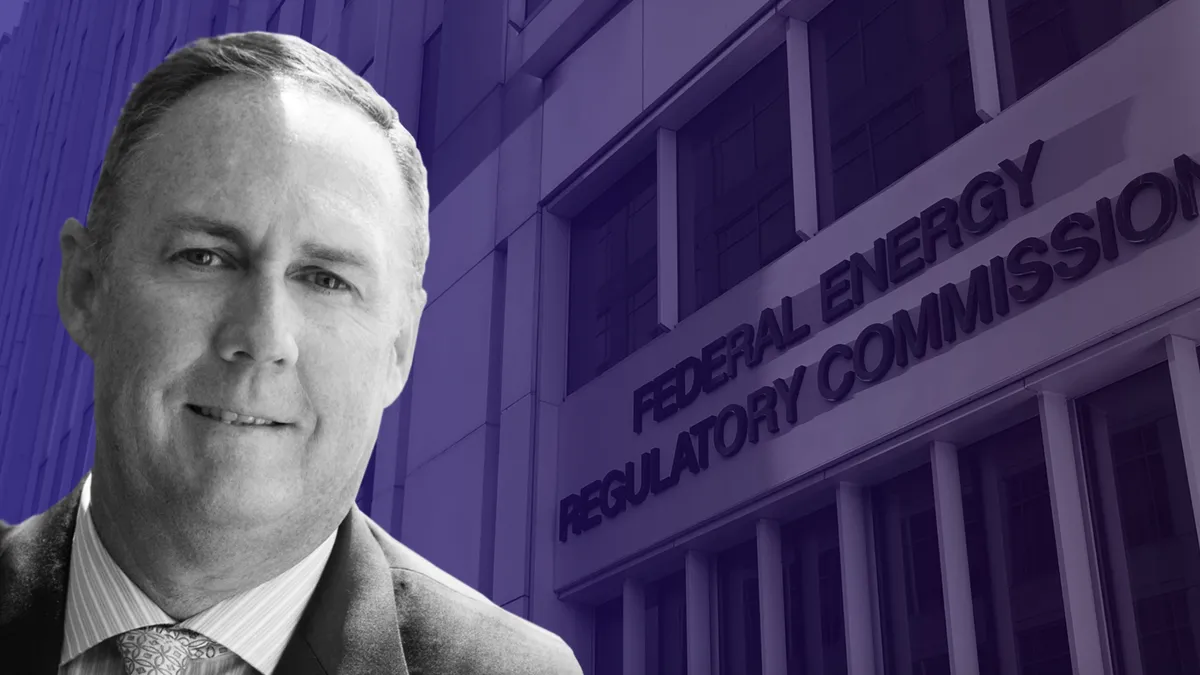Robert Powelson has no regrets about his time serving on the Federal Energy Regulatory Commission — or his decision to step down a year and a half before his term is up.
“I've done a good decade of public service,” Powelson told Utility Dive on the sidelines of a meeting of the National Association of Regulatory Utility Commissioners on Monday. “I leave with my reputation intact. I think in my short tenure in the FERC world, the employees at FERC respect me for the positions I’ve taken, some of them pretty courageous.”
Powelson announced this month that he would retire from FERC in mid-August to head the National Association of Water Companies, a water utility trade group. The news came as a surprise to many in the utility sector, as his term does not expire until 2020.
Powelson earned a reputation during his year-long tenure as a steadfast supporter of the wholesale power markets that FERC regulates and a persistent critic of the Trump administration’s efforts to override them with federal coal and nuclear subsidies.
Those positions likely mean that the former Pennsylvania state regulator would not have been reappointed by the president if he served out his entire term, but Powelson says that political calculus did not enter into the equation when considering his retirement.
“There was never a conversation about me leaving or being asked to leave. That is fake news entirely,” Powelson said. “There was never a time when someone was calling me or forecasting ahead to 2020 that your reappointment would be in jeopardy. No one ever put that idle threat over me.”
"If that were the case, I would be more emboldened to stay," he added.
Instead, Powelson said the chance to lead the nation’s water trade group — a sector that garnered his close attention as a state regulator — was too good of an opportunity to pass up.
“I wasn’t looking for it and wasn’t talking about it, but at the end of the day, I was just like, this is a no-brainer,” he said. “I had every intention to stay to 2020 at the commission … but I don’t want to look back in 2020 and say I had missed an opportunity.”
Powelson’s departure comes at a critical time for the commission, which is still grappling with high-profile proceedings on grid resilience and its first review of its pipeline approval policy since 1999. Though his retirement could leave the commission in a partisan deadlock, the regulator said he expects little disruption at FERC from his departure and is prepared to leave with his head held high.
“I leave the FERC with no conflict or dark clouds hanging over my head about ethical scandals that we see in the swamp these days,” he said. “I never got a $50 room offer. I paid for my train rides to D.C.”
FERC legacy
Powelson seldom hid his opinions of power market developments during his year on FERC, including the priorities of the White House that appointed him.
In one instance, after FERC rejected the Department of Energy’s plan to bail out struggling coal and nuclear generators, Powelson quipped at an industry conference that the DOE’s proposal was D-O-A — dead on arrival. In another, he decried attempts from generator FirstEnergy to win subsidies for its plants during a Senate hearing, saying it and the administration were pushing FERC to create “moral hazards” in the market.
Those type of comments, along with some forceful opinions on state energy policies, earned Powelson more than a few opponents in the coal and nuclear sector. But the outgoing regulator said he is comfortable with the stances he took during his tenure.
“There's probably some that will crack champagne bottles on the announcement of my departure and good for them,” Powelson said. “They were the same individuals that were treated very fairly when I was chairman of the Pennsylvania Public Utilities Commission approving mergers and setting [return on investment rates] and putting utility rate mechanisms in place.”
When he was confirmed to FERC, many in the power sector expected Powelson to be a consistent supporter of industry interests, particularly those of the natural gas sector, a major player in his home state in Pennsylvania. But while he voted consistently to approve pipelines, Powelson also clashed with state energy policies that he viewed as interfering with FERC’s jurisdiction over wholesale power markets.
That stance put him at odds with generator interests in cases like ISO-New England’s capacity market reform proposal, where he argued in a dissent that if states want to dictate the outcomes of power markets, they should "also assume the responsibility for resource adequacy and reliability.” He also supported FERC’s rejection of similar capacity market proposals from PJM, writing that “individual state decisions to re-regulate should be an overriding factor in our decision-making.”
That support for protecting market outcomes earned Powelson few friends among independent generators, who are squeezed by low prices in wholesale power markets, but he expressed no reservations about those opinions.
“I was pretty open about my support for markets,” he said. “Protecting the public interest standard is what you sign up to do. You’re not supposed to sit there and vote 80% or 90% of the time with everything the company puts in front of you. You’ve got to deliberate this stuff, you’ve got to vet it, you’ve got to ask technical questions, and at the end of the day, what’s embedded in all of these decisionmakings is the public interest standard.”
Unfinished business
Powelson’s departure raised eyebrows in the power sector in part because it will leave FERC with only four regulators until a replacement can be confirmed. That will empower the two Democrats on the commission who have been critical of FERC’s pipeline approvals and climate policy, as a 2-2 split is enough to reject a proposed project or market change.
Sen. Lisa Murkowski, R-Alaska, the chair of the Senate Energy and Natural Resources Committee, which vets FERC nominees, expressed concern last week that Powelson’s departure will slow pipeline approvals, but the outgoing regulator dismissed those worries.
“I don't think there's any regulatory uncertainty on the horizon as many people have touted,” he said. “We still have a quorum.”
Powelson said he did not know if either of the two Democrats on FERC would vote for new pipeline approvals, but expects them to look at each proposal on a case-by-case basis.
“There’s one less vote, but at the end of the day, we don’t build natural gas infrastructure on speculation,” he said. “I don’t think you’re going to see this continental divide in the inability of my colleagues to work and solve some of these pipeline challenges.”
The Republican majority on FERC, however, is set to take advantage of Powelson’s vote at what is set to be his last open meeting on Thursday. The commission has teed up orders on multiple interstate pipelines, including the controversial Millennium, Constitution and Nexus projects.
“We have approved close to $100 billion in new energy infrastructure,” Powelson said. “All these projects are kind of like a reinsurance policy now in these markets, creating redundancies.”
Those pipelines are also at the center of a swirling controversy over federal subsidies for coal and nuclear plants. After FERC rejected its proposal to bail out the plants in January, the Department of Energy reframed its argument to support the struggling generators, saying they are essential to protect the grid from security risks to natural gas pipelines. Trump, citing those security concerns, directed DOE to devise a strategy to keep the plants online in March.
Powelson, who, like all FERC regulators, receives classified intelligence briefings on threats to the energy sector, said those security arguments are a red herring.
“Let’s be very careful not to walk down that Freudian trap of picking one asset over another or saying one industrial control system is more reliable than another,” he said. “That narrative keeps a lot of people on edge about if we are going to pick winners and losers.”
All infrastructure can be vulnerable to both physical and cyber attacks, Powelson said, and the threat demands a holistic evaluation of multiple industries, not blanket support for coal and nuclear assets.
“Let’s talk about water infrastructure, because what happens if a water pipe goes down and you can’t cool a coal plant or a nuclear plant,” he said. “It’s not one of those issues of a particular asset needs three more dollars a megawatt-hour to be competitive. That’s not what this conversation should be about.”
Powelson said he does not know who the White House is considering to replace him on the commission, but the new nominee could look quite different than the outspoken state regulator. Powelson credited Trump advisors Gary Cohn and Mike Catanzaro with vetting him for his post, but both figures have since left the White House.
“All I know is, I interviewed with Gary. I can remember it vividly, the conversation we had about markets, gas markets. We talked at length about where the electric grid has evolved,” he said. “They knew my DNA coming in and they were both advocates for competitive markets.”
Despite stepping down early, Powelson said he is secure with his legacy at FERC, which he views as protecting and expanding competitive markets.
“The last year was just unbelievable in terms of the stuff we were able to get done,” he said. “I can go back to Kennett Square, Penn., and say that in less than a year’s time I had a profound impact working with my colleagues on energy policy.”
Correction: An earlier version of this article erroneously stated that nearly a dozen pipeline applications are up for approval at FERC's Thursday meeting. Some of those orders regard rehearing requests, not outright approvals, such as the Constitution, Nexus and Millennium pipelines.






















